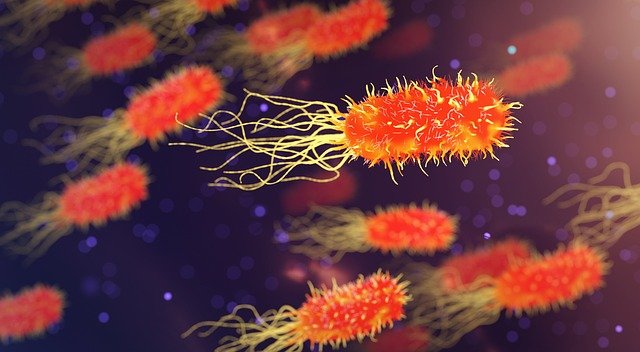The intestine does not only have a digestive function. It is also the first immune defence organ in humans. A complex system which, by disrupting itself, exposes to allergic or inflammatory reactions. Here is a guide on centerpiece of the immune system.
Summary
- An intestinal flora made up of billions of bacteria
- In the intestinal flora, bacteria beneficial to our health
- The multiple roles of bacteria
- The “gastro” lowers our immune defenses
- What happens when the intestinal defense system fails?
- Food allergies
- Gluten intolerance
- Child atopic eczema
- Inflammatory diseases
Our immune system protects us from aggressors in the body (viruses, bacteria, etc.) like a sort of castle. The intestine performs this function thanks to a complex ecosystem.
Allergies, for example, correspond to exacerbated defense reactions of the organism against substances usually encountered. Our flora (or microbiota) normally helps us recognize the food we eat as good for ourselves. If the latter becomes unbalanced, intolerance may occur to food or bacteria in the intestinal flora which then behave as aggressors (allergens).
An intestinal flora made up of billions of bacteria
The fortified castle represented by our digestive tract sets up three lines of defense. Indeed, digestive immunity depends on both the intestinal immune system, the intestinal mucosa or barrier, and the intestinal flora.
- More than half of the body’s defense cells make up this immune system housed deep in the intestine. They would not only allow food and bacteria in the intestine to be tolerated, but above all would defend the body by attacking pathogenic germs.
- The intestinal mucosa, made up of a thin layer of epithelial cells covering the digestive tract, acts as a more or less permeable barrier as needed. It lets certain substances through and blocks the path to pathogens.
- Finally, hundreds of billions of bacteria essentially colonizing our colon constitute the intestinal flora, composed of a thousand different species, of which only 20% are well known.
In the intestinal flora, bacteria beneficial to our health. An essential link in immunity, the intestinal flora (microbiota) is specific to each individual, even if there are common bacterial species. Schematically, two major bacterial groups are distinguished, and their balance seems to depend on our health.
The multiple roles of bacteria
Flora bacteria have multiple functions. They “feed” other bacteria, intervene in digestion, stimulate the process of tolerance and defense of immune cells, act on the permeability of the intestinal barrier …
“Certain commensal bacteria (beneficial to our organism) prevent, for example, pathogenic bacteria from settling in the intestine by occupying the ground in the manner of a crowded subway train,” explains experts.
The “gastro” lowers our immune defenses
Each of these components of the immune system plays its own role. However, as these are closely entangled, the disruption of the functioning of one leads to that of the entire system.
Thus, digestive infections (gastroenteritis type) are often responsible for the disruption of the intestinal flora, the result being a chain reaction. The profile of the flora changes and therefore no longer has the same capacity to defend itself against pathogens. The intestinal barrier can open to intruders and the tolerance system is in turn disrupted. As a consequence, sometimes later, a certain number of allergic and/or inflammatory reactions.
What happens when the intestinal defense system fails?
Some common pathologies are explained, in part, by a dysfunction of the immune system in the intestine.
Food allergies
Originally, an imbalance in the intestinal flora would act on the intestinal barrier, increasing its permeability. The junctions of the epithelial cells (normally tightened by the work of bacteria) loosen and allow toxic elements to pass through the body. Peanuts, cow’s milk (lactose), egg white… these foods are the most commonly involved in these reactions. This type of allergy causes digestive micro-inflammations, themselves sources of local pain, diarrhoea, bloating, even reactions from a distance, skin or others …
Gluten intolerance
Also called celiac disease, this pathology linked to an immune disturbance against antibody results in the destruction of the epithelial cells of the intestine. In practice, it results in a permanent intolerance to gluten, a protein found in the vast majority of foods. A daily life very demanding for patients, because the treatment consists essentially of removing gluten from their diet.
Child atopic eczema
It could come from an imbalance of the intestinal flora. Babies (genetically predisposed) can from birth become allergic and develop a skin allergy, eczema. By modifying the intestinal flora, the symptoms can improve. “A Finnish team would indeed have succeeded in reducing this skin phenomenon by providing an additional bacterium in the form of food (the famous probiotics)”, explains experts. centerpiece of the immune system
Inflammatory diseases
In addition to a genetic component, immune dysfunction is inflammatory bowel disease (IBD). The intestinal flora could also be implicated by intolerance to one of its own bacteria (hypothesis mentioned in Crohn’s disease). These pathologies would result from an imbalance between the aggression and defense mechanisms of the digestive wall, and the immune system would be overwhelmed by the situation.
Fasting Method in Intermittent: How to slim down with IF
Gluten: Advantages and Disadvantages
Indian Gluten Free Diet: Definition, Benefits and Dangers

